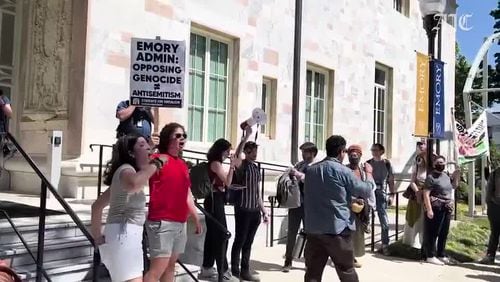COMPARING COLLEGE COST
The cost difference between in-state and out-of-state tuition University System of Georgia colleges varies widely. Here are per semester tuition rates, effective fall 2013:
Institution, in-state tuition; out-of-state tuition
- Georgia Tech, $4,129; $13,781
- University of Georgia, $4,014; $13,119
- Georgia College and State University, $3,400; $12,350
- Georgia State University, $3,900; $13,005
- *Georgia Southern University, $2,487; $8,778
- **Albany State University, $2,312; $8,413
- Georgia Gwinnett College, $1,731; $6,460
- ***Abraham Baldwin Agricultural College, $1,459; $5,388
- ****Atlanta Metropolitan State College, $1,298; $4,911
Source: University System of Georgia, Board of Regents approved fiscal 2014 undergraduate tuition rates
Notes: * - same rate for Valdosta State, Columbus State, and Kennesaw State universities, University of North Georgia, University of West Georgia
** - same rate for Armstrong Atlantic State, Clayton State, Fort Valley State, Georgia Southwestern State and Savannah State universities
*** - same rate for College of Coastal Georgia and Dalton State, Gordon State and Middle Georgia State universities
**** - Bainbridge State, Darton State, East Georgia State, Georgia Highlands, Georgia Perimeter and South Georgia State colleges
Rigoberto Rivera grew up in Georgia, he graduated from Roswell High School and he and his parents are paying state income taxes. Now he wants to go to college and study criminal justice in his home state.
But he said he can’t afford it because Georgia won’t let him pay its in-state tuition rate, which is several thousand dollars below the out-of-state rate. The reason: Rivera was illegally brought here from Mexico as a child and doesn’t have legal status in the U.S. like a citizen or a green card holder would.
Rivera and 38 other immigrants like him are now suing the state, arguing it is not following its own tuition policy. At the center of the lawsuit is a controversial Obama administration program that has granted people including those 39 a temporary reprieve from deportation. The federal government says people granted that benefit are legally present in the U.S. Being in the U.S. legally is what Georgia’s in-state tuition policy requires.
Similar legal battles have been raging in other states since 2012, when the federal government started the Deferred Action for Childhood Arrivals program.
There are strong feelings on all sides of the debate. Opponents of Rivera’s argument say taxpayer-funded benefits should be reserved for those who have legal status in the U.S. Supporters say it makes sense to award in-state tuition rates for students like Rivera who could contribute more to Georgia’s economy after boosting their skills in college.
Rivera, 24, lives with his parents in Roswell. He helps cover his family’s household expenses by cleaning houses, though he dreams of becoming a lawyer or starting a career in law enforcement.
“Sometimes you get depressed,” he said of his inability to afford college in Georgia. “When you talk to your friends that you had in high school and you find out that they finished their bachelor’s degree two years ago … it makes you feel horrible.”
A spokesman for the Board of Regents declined to comment because the legal case is still pending. But the board has argued in court papers that as a governmental body it is shielded from the lawsuit and that the plaintiffs have not pursued the board’s administrative appeals process. The students have repeatedly demonstrated at Board of Regents meetings and at some state universities.
The board also said it hasn’t been established whether the plaintiffs “meet the regulatory and statutory requirements of legal presence in the state of Georgia” to qualify for in-state tuition.
It’s unclear how many people are affected by Georgia’s approach. A University System survey found there were 501 “undocumented” students enrolled in its institutions in fall 2010. Nationwide, 521,815 people have been approved for the Deferred Action for Childhood Arrivals program since it started. Of those, 16,302 are Georgians.
The program applies to immigrants who were illegally brought here as children and attended school here and haven’t been convicted of felonies. Those accepted into the program are granted renewable two-year deportation deferrals and federal work permits.
Nineteen states have laws or policies allowing people who meet certain criteria to pay in-state tuition rates, regardless of their legal status, according to the Los Angeles-based National Immigration Law Center, an immigrant-rights organization.
“If you just look at this from a state development, economic development standpoint, I find it surprising that any state would put in place anything that could hurt the state economically,” said David Hurley, associate vice president for government relations and state policy at the American Association of State Colleges and Universities. “On a national scale Georgia is way, way on one end of the spectrum.”
Georgia’s University System also prohibits students in the deferred action program from attending any institution that has not enrolled all of its academically qualified applicants for the past two years. Right now some of the system’s largest and most elite institutions fall under this provision, including the University of Georgia, Georgia Tech, Georgia State, Georgia Regents and Georgia College and State universities.
Observers have compared the fight over in-state tuition to a similar battle over issuing state driver’s licenses to deferred action recipients. This month, a bipartisan vote in the state Senate killed an attempt to deny them Georgia driver’s licenses. Similar efforts have emerged in other states. In 2012, Arizona Gov. Jan Brewer, a Republican, issued an executive order banning state driver’s licenses for deferred action recipients.
The following year, Arizona Attorney General Tom Horne sued the Maricopa County Community College District for allowing deferred action recipients to pay in-state tuition. Horne said the district is violating state law. The community college system says it is complying with the law by accepting applicants’ federal work permits as proof they are legally present in the U.S. The case is still pending.
Meanwhile, a bill that would exempt immigrants without legal status from paying out-of-state college fees is pending in the Florida Legislature. A group called Floridians for Immigration Enforcement is opposing the measure, saying it would displace “legal students.”
In recent years, Georgia’s Republican-controlled Legislature has enacted several measures to block immigrants without papers from receiving public benefits, though none of those laws bar them from paying in-state tuition.
Shawn Hanley, the vice chairman of Georgia’s Immigration Enforcement Review Board, said the lawsuit against the Board of Regents relies on technicalities.
“The spirit of the laws here in Georgia — and the intent — is pretty clear: to discourage continuous illegal immigration to the state,” he said. “Barack Obama certainly doesn’t represent the Georgia Legislature or the intent of our local laws.”
Michael Olivas, who has testified in similar lawsuits in other states and teaches immigration law at the University of Houston, predicts Georgia will lose the legal battle. He cited the wording in the Board of Regents’ in-state tuition policy, which says noncitizens aren’t eligible for the benefit unless they are “legally in this state.”
“The arithmetic on this is very easy,” said Olivas, a board member with the Mexican American Legal Defense and Educational Fund. “I have never seen such a clear-cut case.”
About the Author






